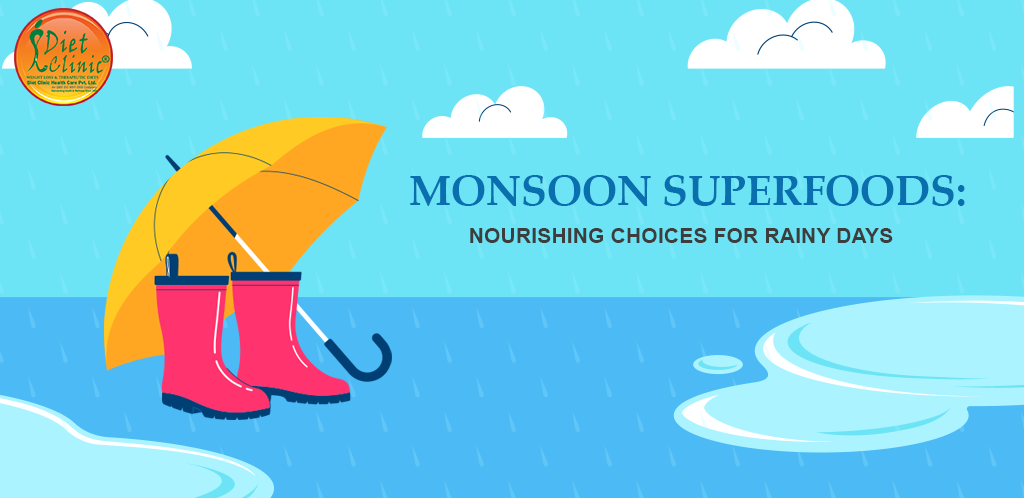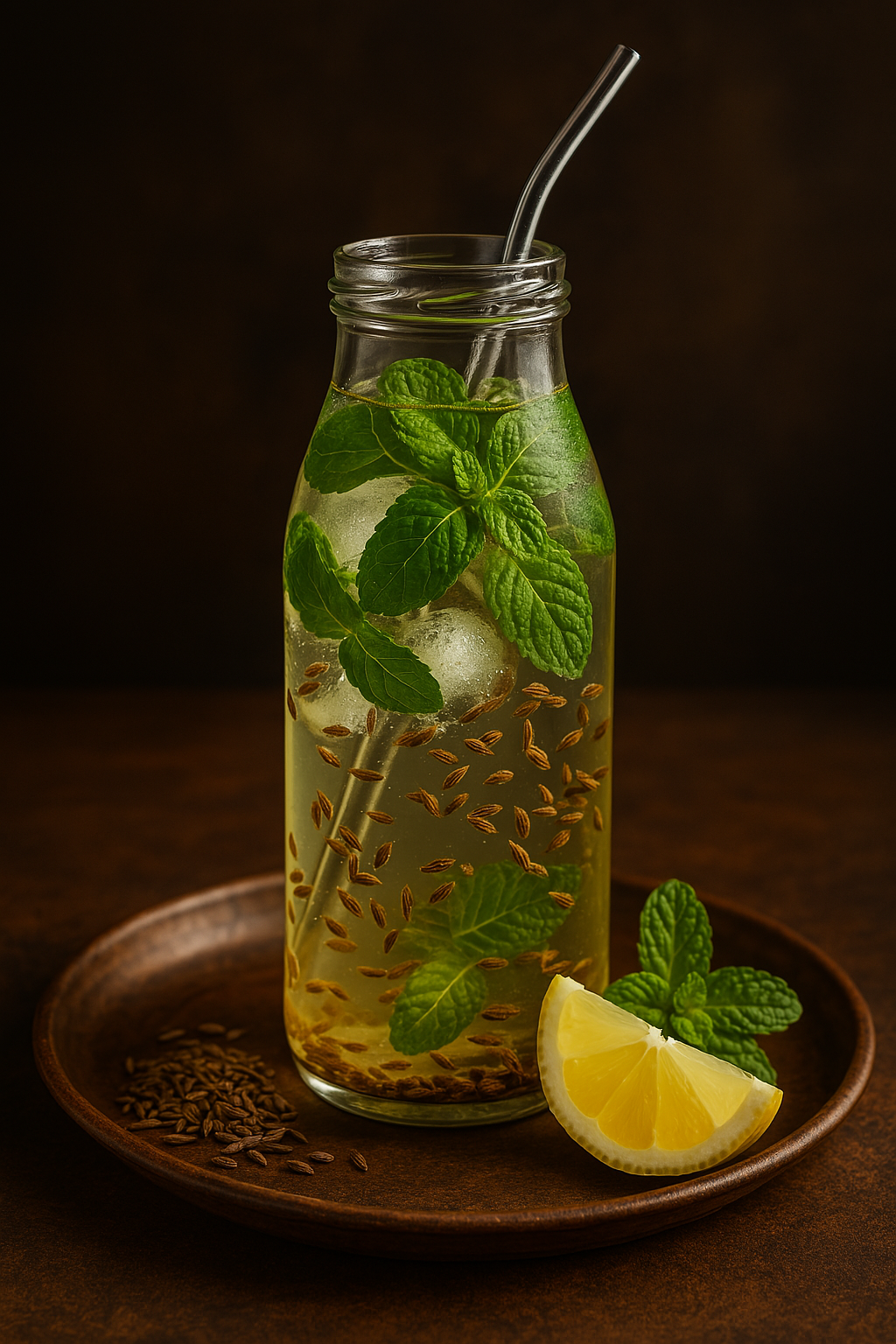
Dietician Sheela Seharawat
Monsoon Superfoods: Nourishing Choices for Rainy Days
The monsoon season brings with it a sense of freshness and rejuvenation. The earth soaks up the rain, and the air is filled with the earthy scent of petrichor. While monsoons can be incredibly refreshing, they also bring their set of challenges, such as increased humidity and a higher risk of infections. As a dietician, I believe that one of the best ways to stay healthy and vibrant during the rainy season is by making nourishing food choices. In this blog, we'll explore a range of monsoon superfoods that can help you stay on top of your health game and enjoy the rainy days to the fullest.
Why Nourishment Matters During Monsoons:
The monsoon season is associated with a higher susceptibility to infections, primarily due to the increased humidity and the proliferation of bacteria and viruses. Moreover, the change in weather can often lead to a weakened immune system and digestive issues.
Nourishing your body with the right foods is essential during this time to:
Boost Immunity: A strong immune system is your best defense against monsoon-related illnesses. Nutrient-rich foods help bolster your immunity.
Enhance Digestion: Monsoon can often lead to digestive problems. Choosing foods that are easy on the stomach can prevent discomfort.
Provide Energy: Rainy days can sometimes make you feel lethargic. Energizing foods can help you stay active and upbeat.
Combat Infections: Antioxidant-rich foods can protect your body from infections and inflammation.
Monsoon Superfoods to Embrace:
Turmeric: This golden spice is a potent anti-inflammatory and antioxidant. Turmeric can help boost your immunity and protect against infections. You can add it to curries, soups, or even make a soothing turmeric tea.
Ginger: Ginger is a digestive powerhouse. It can help alleviate digestive discomfort and nausea often associated with monsoons. You can make ginger tea or add it to stir-fries and soups.
Garlic: Garlic is known for its antimicrobial properties. It can help your body ward off infections. Include garlic in your meals or consume it raw for maximum benefits.
Tulsi (Holy Basil): Tulsi is revered for its immune-boosting and anti-inflammatory properties. Make a cup of tulsi tea by steeping fresh or dried leaves in hot water.
Citrus Fruits: Oranges, lemons, and limes are packed with vitamin C, which is vital for immune health. Enjoy fresh citrus fruits as a snack or make a refreshing citrus salad.
Leafy Greens: Leafy greens like spinach and kale are rich in vitamins and minerals that support overall health. They also provide fiber for better digestion.
Hot Soups: Warm soups can be incredibly comforting during the rainy season. Opt for clear broths or vegetable soups to soothe your throat and provide nourishment.
Lean Proteins: Protein is essential for the repair and growth of tissues. Include lean protein sources like chicken, fish, tofu, or legumes in your diet.
Yogurt: Yogurt is a probiotic-rich food that can help maintain gut health. Enjoy it as a snack or make a cooling raita to go with your meals.
Nuts and Seeds: Almonds, walnuts, and flaxseeds are excellent sources of healthy fats, vitamins, and minerals. They provide sustained energy and keep you feeling full.
Herbal Teas: Herbal teas like chamomile, peppermint, and fennel can aid digestion and promote relaxation.
Tips for Healthy Monsoon Eating:
In addition to incorporating monsoon superfoods into your diet, here are some tips to help you make nourishing choices during rainy days:
1. Stay Hydrated:
While it's essential to stay hydrated, avoid drinking cold water during monsoons. Opt for warm or room temperature water to support digestion and immunity.
2. Avoid Street Food:
Street food can be tempting, but it's best avoided during the monsoon season. The unhygienic conditions can pose a significant risk of infections.
3. Wash Fruits and Vegetables Thoroughly:
Make it a habit to wash fruits and vegetables thoroughly before consumption. Use clean water and a vegetable wash if available.
4. Cook Food Thoroughly:
Ensure that all your meals are cooked thoroughly, especially meat and seafood. Cooking kills bacteria and ensures food safety.
5. Avoid Raw Seafood:
Raw seafood, like sushi and ceviche, should be avoided during the monsoon season to minimize the risk of foodborne illnesses.
6. Opt for Light Meals:
Heavy, greasy meals can be hard to digest during monsoons. Choose lighter, well-balanced meals to prevent digestive discomfort.
7. Maintain Good Hygiene:
Practice good personal hygiene to prevent the spread of infections. Wash your hands frequently and avoid touching your face with unwashed hands.
8. Use Immunity-Boosting Spices:
Include spices like black pepper, cinnamon, and cloves in your meals. They not only enhance the flavor but also have immune-boosting properties.
9. Listen to Your Body:
Pay attention to your body's hunger and fullness cues. Eat mindfully and avoid overeating.
10. Prioritize Sleep:
Adequate sleep is crucial for your body's recovery and immune function. Aim for 7-9 hours of quality sleep per night.
Monsoon superfoods provide you with the nourishment you need to stay healthy and vibrant during the rainy season. By incorporating these nutrient-rich foods into your diet and following the tips for healthy monsoon eating, you can protect your immune system, support digestion, and maintain your energy levels. Remember that making conscious dietary choices is an essential part of self-care, and it can help you fully enjoy the beauty and freshness that the monsoon season brings.








